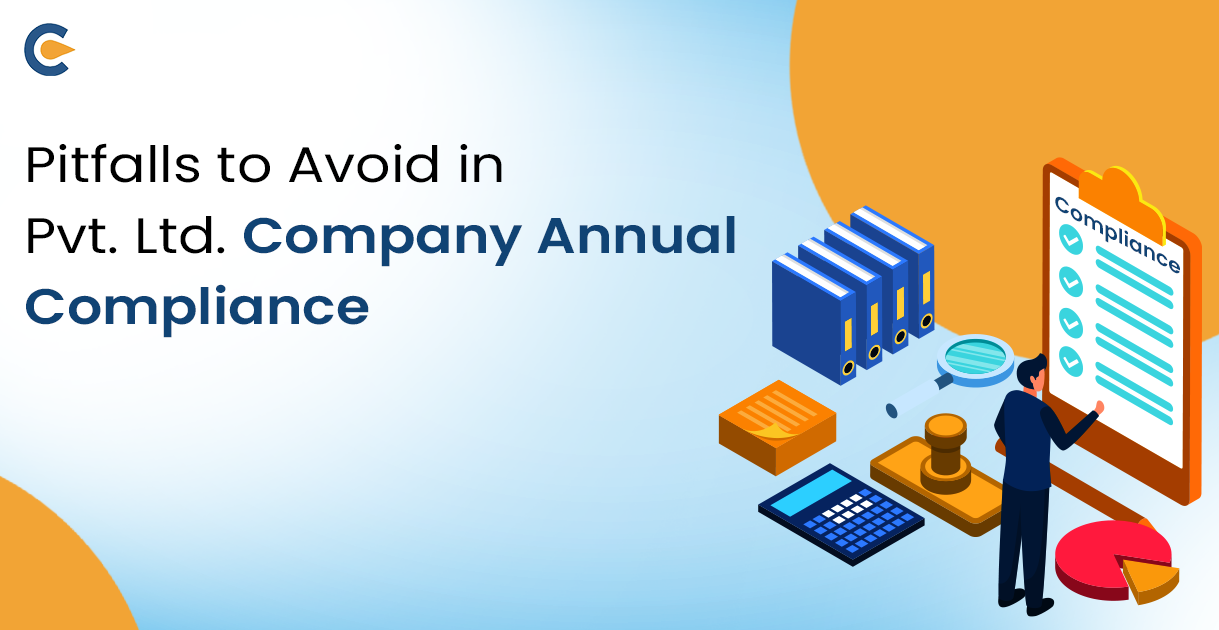There are a number of companies that are registered daily in the country, and some are of the intention of fraud. There have been many frauds reported in recent times even though the company registration rules are so strict. One can take an example of fraud done by Ashtvinayak company in Pune or the AS Agri Aqua in Thane, Maharashtra. In recent years, there have been many private company registrations, and these would only increase with time, so it is important to follow the legal compliances and rules and regulations set by the authorities from time to time so that it can help them figure out any potential frauds at the beginning itself. Ensuring the Annual compliance of the company would make the company work smoothly, be free from any legal fines and penalties, and also maintain the social image of the company.
Things to Avoid in Pvt. Ltd. Company Annual Compliance
Pvt. Ltd. company annual compliance includes many necessary things to be done and also Mistakes to avoid in the company’s annual compliance. The things to avoid in the annual compliance of the company are –
Not Holding AGM
The companies registered under the Companies Act, 2013 should hold their annual general meetings every year after the end of a financial year to abide by the Pvt. Ltd. company annual compliance. This meeting should be held within six months of the financial year from its end. In this meeting, the finances and total performance of the company of the previous year are looked at, and new policies are to be initiated for the better performance of the company in the next year’s quarterly. On non-compliance, the company may face legal liabilities and fines, and the directors of the company may also face such fines.
Delay in Annual Returns Filling
Pvt. Ltd. company annual compliance is not completed till the annual returns of the company are filed with the registrar of companies within a definite time. These annual returns contain the details of the finances and company details, and if these are not filed within the time limit, then there can be many fines and penalties levied on them.
Tax non-compliance
Tax filing is a very important aspect for any company and even for an individual in the country. The company management has to look into the proper filing of income tax, GST, and other taxes, if applicable, to complete the annual compliance of the company. The non-compliance in filing these taxes and returns on time may include several penalties and fines. The registrar of the company can take severe measures against the defaulting company; hence, the director of the company must necessarily comply with the regulations and file the tax without hiding anything, as it may be considered fraud.
Avoiding changes in compliance
One of the mistakes to avoid in the company’s annual compliance is that of keeping up with new policies and regimes set by the government and concerned authorities for the companies. The company may have complied with every detail but doesn’t know about the change in rules and regulations, so such compliance at their end will mean nothing. This is why the companies and the managerial persons need to be updated on the latest changes in regulations, such as important deadlines, tax compliance or its percentage change, statutory requirements, etc.
Record Keeping errors
To maintain the Pvt. Ltd. Company Annual Compliance, all the companies need to maintain the records of the organization without fail. These include minutes of the meetings, resolutions passed in those meetings, contracts with other individuals or entities, etc. Failure to do so means the company can be charged with several monetary charges. If record-keeping is not done professionally, then it may lead to problems in the future when handling the legalities of the business.
Incorrect Financial Statements
To follow the Pvt. Ltd. company annual compliance, the company needs to file the correct financial statements. These financial statements must contain the statements of profits or losses in that period, assets and liabilities of the company at the end of the financial year, and its financial position till then. The inaccuracy in terms of financial statements can also lead to legal complications and sometimes even regulatory scrutiny that may lead to the delisting of the company as well.
Neglecting Shareholders
Another mistake to avoid in the company’s annual compliance is neglecting the presence and importance of shareholders of the company. There should be proper transparency with the shareholders, and they should be given a clear picture of the company’s standing and where it is heading in the coming years. To abide by the Pvt. Ltd. company annual compliance, you need to be very transparent with all the shareholders, or else there can be legal complications involved against the organization.
Avoiding maintenance of Statutory Registers
Under the Companies Act, 2013, private limited companies are required to keep statutory registers, such as members, directors, and share registers. Neglecting these registrations and not complying with Pvt. Ltd. company annual compliance might result in sanctions and harm the company’s reputation. These registers serve as critical documents that capture vital parts of the company’s structure and ownership, guaranteeing transparency and regulatory compliance. Failure to keep them correct and up to date might have legal ramifications, affecting the company’s reputation and credibility in the eyes of stakeholders and regulators. To sustain legal requirements and protect their integrity, private limited companies must diligently maintain statutory registers.
Non-Compliance of Directors
The directors hold a very important position in the company and take the responsibility of making important decisions for the company. If the directors of the company fail to comply with Pvt. Ltd. company annual compliance, then along with the company, the directors can even be made personally liable for fines of non-compliance. The directors must commence their duties in a way that is required to be done without fail.
Conclusion
Pvt. Ltd. company annual compliance needs to be followed by the organizations registered under the Companies Act, 2013 to avoid any legal issues in the future. Abiding by the company’s annual compliance leads to a smooth and secure business environment that ultimately increases business growth opportunities. By following these compliances, your company’s reputation will never shoot down, and it will have more authenticity, which in turn will attract several investors and clients, leading to its overall development. In short, Pvt. Ltd. company annual compliance ensures the smooth work of the organization without much trouble in the market.
Corpbiz can help individuals and their companies maintain these compliances and ensure timely filing and compliance with all the necessary things that a company ought to perform during the course of its business in the country. We have a pool of experienced individuals who will make the life of an organization long and sustainable in the market by helping them comply with all the legal, regulatory, or statutory provisions.
Frequently Asked Questions
What basic problem is faced while filing GST for a business?
While filing the GST returns, there is a lot of data that needs to be added, and sometimes there is confusion and mistakes in filling forms GSTR-1 & GSTR-3B. This is a common mistake, and the person filling these forms should be highly alert since once this form is submitted, it cannot be amended like the previous VAT and service tax returns before the introduction of GST (2017).
What is included in the ROC compliance?
ROC compliance means Pvt. Ltd. company annual compliance that should be submitted to the registrar of companies after the end of each financial year. These include the details of the business, finances, and its activities. This gives a clear picture of the business and avoids further legal scrutiny or the fines involved by the company.
What is the compliance for annual returns?
Companies need to file their annual returns within 60 days of the Annual General Meeting. These returns are for the period from April 1st to March 31st (previous financial year), and they need to be filed to the registrar of the company in Form MGT-7; failing to do so will lead to certain penalties and fines.
How much monetary compensation is there for non-compliance?
If there is non-compliance with the rules and regulations by the company, then it may have to pay a penalty of Rs 10,000 that may extend up to Rs 2 Lakhs; for the directors of the company, these penalties may range between Rs 10,000 and 50,000, and the penalties for any official involved can go up to Rs 5,000.
When can the companies call for an Annual General Meeting?
The companies registered under the Companies Act, 2013 should hold the Annual General Meeting of the company every year after the end of a financial year to abide by the Pvt. Ltd. company annual compliance that should be held within six months of the financial year from its end.
What do you mean by the legal compliance of a company?
Legal compliance of a company means following all the laws, rules, and regulations that are there for a company in the course of its business. These may also include any licenses or certifications needed before the business commences its proceedings in the market.
What is included in a compliance cost?
Compliance costs include all the costs a company incurs while abiding by the compliances set by the authorities. These may include the compliance manager’s salary/expenses, costs incurred while filling the reports, fees paid (if any), or regulatory costs in the process.
What is the need for doing a Statutory Audit for a Pvt. Lt. Company?
The need to do a statutory audit for a Pvt. Ltd. Company is that it gives a clear picture of the company's finances through the books of accounts. According to the Companies (Accounts) Rules, 2014, these audits need to be done after the end of each financial year.
How can a company meet its Pvt. Ltd. Company Annual Compliance?
A company can meet its Pvt. Ltd. company annual compliance by formulating rules and procedures to do the act and appointing able personnel to get the job done in the desired time frame.
What is the number of directors a private limited company can appoint?
A private limited company has to appoint a minimum of two directors and a maximum of 15 directors.
Read Our Article: Mandatory Annual Compliances For One Person Company











